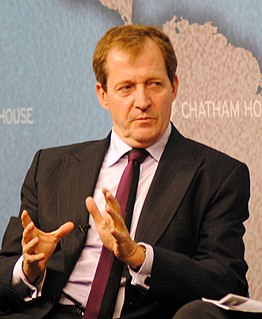A Quote by Alastair Campbell
By asking the question 'Am I happy?,' and via the answer setting out what I mean by happiness, there is a political route that can be taken, by asking another question - 'Can politics deliver happiness, and should it try?'
Related Quotes
It's the most annoying question and they just can't help asking you. You'll be asked it at family gatherings, weddings, and on first dates. And you'll ask yourself far too often. It's the question that has no good answer. It's the question that when people stop asking it, you'll feel even worse. - WHY ARE YOU SINGLE?
So what is happiness? I am sure this question will be asked through the ages. And I doubt there is one answer for all people. Like heaven and hell, one person's happiness can be another person's unhappiness, which is why I'm not attempting to tell you what to do to find your happiness. I have enough trouble finding and hanging onto my own true happiness.
What is there to understand? The significance of life? How long will it take to understand the significance and the meaning of life? 20 years? 30 years? And the same question will be here in another 20 years, I guarantee you. Until you stop asking that question. When that question is not there, you are there. So that's the reason why you keep asking the question: you do not want the question to come to an end. When that comes to an end, there will not be anybody, left there, to find out the meaning, the purpose and the significance of life.
If you don't put the spiritual and religious dimension into our political conversation, you won't be asking the really big and important question. If you don't bring in values and religion, you'll be asking superficial questions. What is life all about? What is our relationship to God? These are the important questions. What is our obligation to one another and community? If we don't ask those questions, the residual questions that we're asking aren't as interesting.
Researchers have been asking a basic question of young people. Should men be allowed to beat their wives? How you answer that question may depend on where you live. U.N. researchers put that question to adolescent girls in India and Pakistan and 53 percent - a majority of girls - said yes, wife beating is justifiable even if it's for refusing sex.
Perhaps one of the most powerful keys to determining our experience of the months ahead comes from a shift in thinking that invites us beyond asking, 'What can I get from the world that exists,' to asking, 'What can I offer to the world that is awakening?' The way we answer this question as individuals becomes our collective answer to what comes next.
In the Marquette Lecture volume, I focus on the question in the title. I emphasize the social and political costs of being a Christian in the earliest centuries, and contend that many attempts to answer the question are banal. I don't attempt a full answer myself, but urge that scholars should take the question more seriously.

































